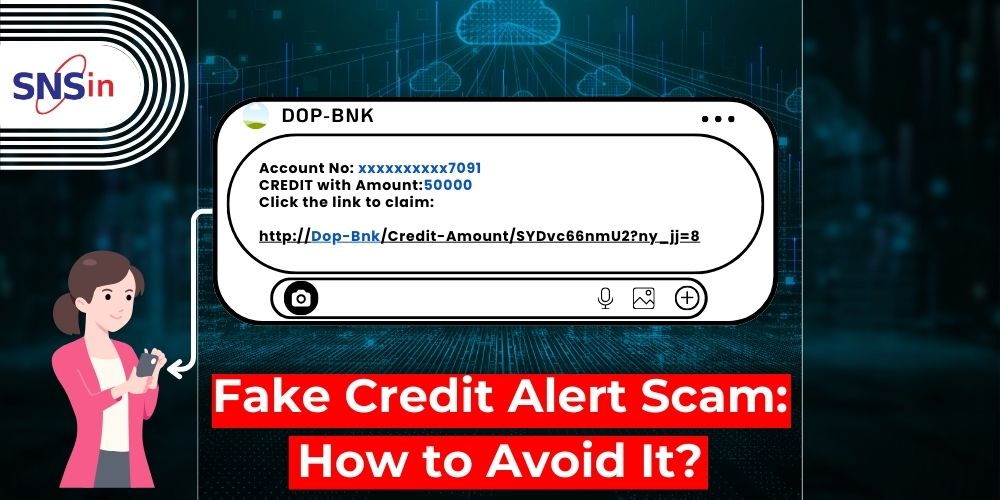Everything is going digital. It is common to find that financial transactions are quite easy and convenient. But this convenience has introduced a new level of threats and scams that affects individuals & organizations. One of these common scams is the fake credit alert scam.
In this blog, we will discuss how fake credit alert scam operates, and what measures people can take to protect themselves against the scam.
What is the Fake Credit Alert Scam?
The fake credit alert scam is a type of social engineering threat where the attacker sends an unsolicited message via the mobile phone or email, warning you that the money is credited to your account.
These scammers aim at making you think you have received the money and offering to assist by performing actions that are beneficial to the scammers, for instance, wiring the money back to them or giving them your banking details.
How the Fake Credit Alert Scam Works?
Fake Alert Notification
The scam starts with an alert notification that is fake. You get notified by a message that appears to originate from your bank or a payment company about a credit to your account.
Follow-up Contact
After the fake credit alert, you would get a call or a message from the scammer again, pretending to be from the bank. They may state that there has been a mistake made or that some other data is necessary for the completion of the transaction.
Request for Information or Action
The scammer then attempts to capture as many of your personal details as possible, such as your account numbers, OTPs, or login details. Instead, they may demand that you refund the money back to them, stating that it was sent to you by mistake.
Exploitation
If the scammer got your information or made you send money, they use it to take money from your account and use your identity for other fraud or identity theft.
How to Identify Fake Credit Alert Scams?
Verify the Source. Users should always confirm the source of any credit alert or notification they receive. In case you receive an unexpected credit alert, use the bank app or the official website to check your account. It is important not to wait for the SMS or the email notification only.
Scrutinize the message. Check if the message is fraudulent. Spelling & Grammar. Suspicious Links. Urgent Language.
Contact Your Bank Directly. In case of any suspicious credit alert, call your bank using their customer service number provided on their website. Never reply to the message or use any of the contact information that is provided in the message.
Check Your Accounts Often. Make it a habit to check your bank statements and your transaction history for signs of fraud. Meaning, timely identification of the potentially fraudulent transactions can help avert huge losses.
How to Avoid Falling Victim to Fake Credit Alert Scams?
Be Skeptical of Unsolicited Messages. If something appears to be too good to be true, then it is most probably a scam.
Enable Security Features. Bank’s security includes two-factor authentication (2FA) and transaction notifications. By enabling these features, there is an added layer of security to the account.
Educate Yourself and Others. Be aware of any new scams that are going around, and make sure to pass this information on to other people. Education is thus an effective weapon that should be employed in curbing fraud.
Use Secure Connections. Do not check your bank statements over public networks. Always connect to a secure, private internet connection to avoid exposing your information to the wrong people.
Install Security Software. Use reliable anti-virus and anti-malware software on all your computing devices. To be safe from any new threats, do software update.
Be Cautious with Personal Information. Do not disclose your bank details, OTPs, or login credentials to anyone. Banks will never request this information via email or phone.
Report Suspicious Activity. If you think you received a fake credit alert, notify the bank as soon as possible. You can contact the Cyber Crime Cell to get the incident investigated further.
Conclusion
Fake credit alert scams are one of the increasing cybercrimes. This blog reveals how these scams work and extra security measures you should adopt to shield yourself from them.
Stay informed, stay cautious, and remember: if you are served with a credit alert that is positive, you should not rush to celebrate but rather confirm it through the relevant authorities. Your financial security is paramount, and a few extra steps can save you from significant losses.
Secure Network Solutions (SNS) has been securing businesses against cyber threats for over 23 years. Empower your workforce with cybersecurity awareness!
Partner with Secure Network Solutions (SNS) for engaging cybersecurity training workshops. Email [email protected] to learn more.
Swathi
Author
Working IT professional and a Cyber Security enthusiast. Passionate to write about Cyber Security topics and Solutions. I share my insights as I study articles and trending topics in the field of Cyber Security.
![]()




